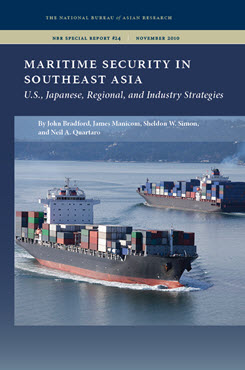NBR Special Report no. 24
Maritime Security in Southeast Asia
U.S., Japanese, Regional, and Industry Strategies
Originally presented at a workshop NBR collaborated on with the Japan Forum on International Relations in Tokyo, Japan, in May 2010, this special report focuses on U.S., Japanese, regional, and industry strategies to combat piracy and other maritime security threats in Southeast Asian waterways.
Pirate activity in strategically important waterways around the globe, from the Strait of Malacca to the waters off the Horn of Africa, has garnered significant attention recently from states dependent on these waters for international trade and the free movement of goods. State responses have ranged from independently dispatching naval forces to patrol major sea lines of communication, to multinational patrols and information sharing mechanisms to increase domain awareness. Less visible, but of equal—or perhaps greater—importance are the efforts of ship owners, operators, and maritime industry groups toward increasing ship security and combating pirate attacks.
Originally presented at a workshop NBR collaborated on with the Japan Forum on International Relations in Tokyo, Japan, in May 2010, this special report focuses on U.S., Japanese, regional, and industry strategies to combat piracy and other maritime security threats in Southeast Asian waterways.
Table of Contents
1: U.S. Strategic Interests and Cooperative Activities in Maritime Southeast Asia
John Bradford
2: Japan’s Role in Strengthening Maritime Security in Southeast Asia
James Manicom
3: Safety and Security in the Malacca Straits: The Limits of Collaboration
Sheldon W. Simon
4: The Challenges of the Jolly Roger: Industry Perspectives on Piracy
Neil A. Quartaro


